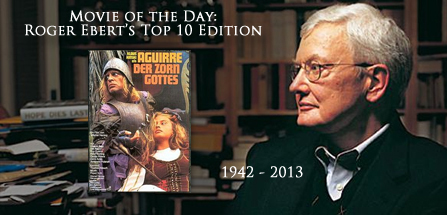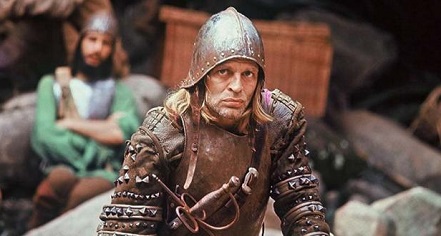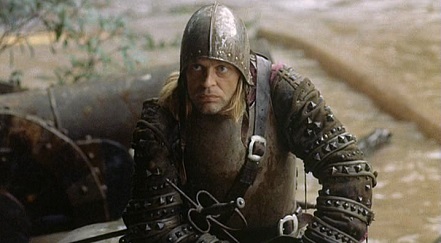The Film: Aguirre, the Wrath of God (1972)
The Principles: Werner Herzog (writer/director), Klaus Kinski, Ruy Guerra, Helena Rojo, Peter Berling, Del Negro
The Premise: In 16th century Peru, hundreds of Spanish conquistadors and their slaves embark on an arduous trek through the jungle in search of El Dorado, the legendary “City of Gold.” Upon reaching an impasse, a group of forty or so soldiers and slaves led by Don Pedro de Ursua (Guerra) and Don Lope de Aguirre (Kinski) are sent further to see if El Dorado is close, upon the condition that should they not return within a week, they will be considered lost. Aguirre’s maniacal desire for power spells doom for all involved as the crew drifts farther and farther into the Peruvian jungles.
Is it any good? We’re discussing what Roger Ebert calls one of the greatest movies of all time, so it should go without saying that it is more than good. Aguirre, the Wrath of God is fantastic, one of the “great haunting visions of cinema,” as Mr. Ebert described it. Klaus Kinski is absolutely terrifying. His presence commands the audience’s attention whenever he is on screen, putting the viewer at his mercy much like the unfortunate band of men coerced into following him. He will not hesitate to kill those who he suspects of rebelling against his authority, and he will stop at nothing to take control of this untamed land and begin his own dynasty.
Herzog and cinematographer Thomas Mauch shot the film on location in Peru, where the director had no qualms about putting the cast and crew through hellish conditions to create this masterpiece. The stunningly beautiful opening shots would not be out of place in an episode of Planet Earth, as we see hundreds of people slowly descending the Andes Mountains into the rough terrain of the jungle below, setting up the “into the unknown” allegory for their impending journey into madness. Accompanying these shots is the eerie sounds of the band Popol Vuh, who provides the sparse soundtrack. “Band” is slightly misleading in this case; the soundtrack consists of a repetitive, creepy series of notes played on what Herzog called a choir-organ but sounds more like a Moog. The film is often shot in a very documentary-like fashion: the sounds of the river and wildlife are often all that we hear for long stretches of time, and it is not uncommon for people to be shot and killed by the natives’ poison-tipped arrows while out of focus or standing in the background. Ebert discussed the ominous sense of quiet throughout the film in his review:
The film is not driven by dialogue, anyway, or even by the characters, except for Aguirre, whose personality is created as much by Kinski’s face and body as by words. What Herzog sees in the story, I think, is what he finds in many of his films: Men haunted by a vision of great achievement, who commit the sin of pride by daring to reach for it, and are crushed by an implacable universe.
Looking through Ebert’s favorite films, it’s evident that the man had an affinity for works that examine the human condition, particularly the dangers of letting one’s vices overtake reason. Aguirre, a film that Francis Ford Coppola cited as a primary influence on Apocalypse Now (another of Ebert’s favorites), does this by keeping the viewer at arm’s length throughout Kinski’s downfall. Herzog’s decision to keep a distance between the audience and the action contributes to the growing sense of isolation around Aguirre and his men as supplies dwindle, morale is erased, and delirium begins to set in. We see man completely out of his element, utterly inept and unable to do what these conquistadors had succeeded in doing so many times before. The final shot of the film – one of the most memorable of all time – leaves the audience acutely aware of both our own vulnerability to the wild, and the ease with which many of us may fall under the influence of those whose pride and unquenchable thirst for power will drown our own sense of reason. In his usual eloquent fashion, Ebert describes the atmosphere Herzog is so adept at creating:
His stories begin in a straightforward manner, but their result is incalculable, and there is no telling where they may lead: They conclude not in an “ending” but in the creation of a mood within us – a spiritual or visionary feeling. I believe he wants his audiences to feel like detached observers, standing outside time, saddened by the immensity of the universe as it bears down on the dream and delusions of man.
What made Ebert not just a fantastic critic, but an amazing person, was his connection with the human spirit. The man was so very in tune with the emotions, the triumphs and pitfalls, and the psychology of his fellow man, that he was able to clue the rest of us in on how powerful film can be in its ability to shine light on these qualities. Aguirre, through its focus on the pitfalls, on the dark underbelly of the human psyche, forces us to acknowledge the potential havoc our vices can wreak when left unchecked. When Ebert said that “empathy is the most essential quality of civilization,” I suspect his familiarity with films such as Aguirre, the Wrath of God further cemented that belief.
Is it worth a look? Absolutely. This was my first time seeing Aguirre and it won’t be the last. It is a film that is brimming with subtext, and Kinski’s deranged performance alone is worth multiple viewings. Plus, it has the Roger Ebert Greatest Films of All Time seal of endorsement. No further recommendations needed.
Random anecdotes: Kinski and Herzog had a notoriously volatile relationship. At one point during shooting, Kinski walked off set and was going to abandon the film until Herzog threatened to kill Kinski and himself. Kinski claimed Herzog actually had him at gunpoint, though the director denies that particular detail.
Klaus Kinski, nutjob that he is, was firing off a rifle on set and ended up blowing the finger off of a crew member.
Herzog wrote the film in two days, and did no storyboarding whatsoever.
Cinematic soulmates: Apocalypse Now, Fitzcarraldo, The New World


